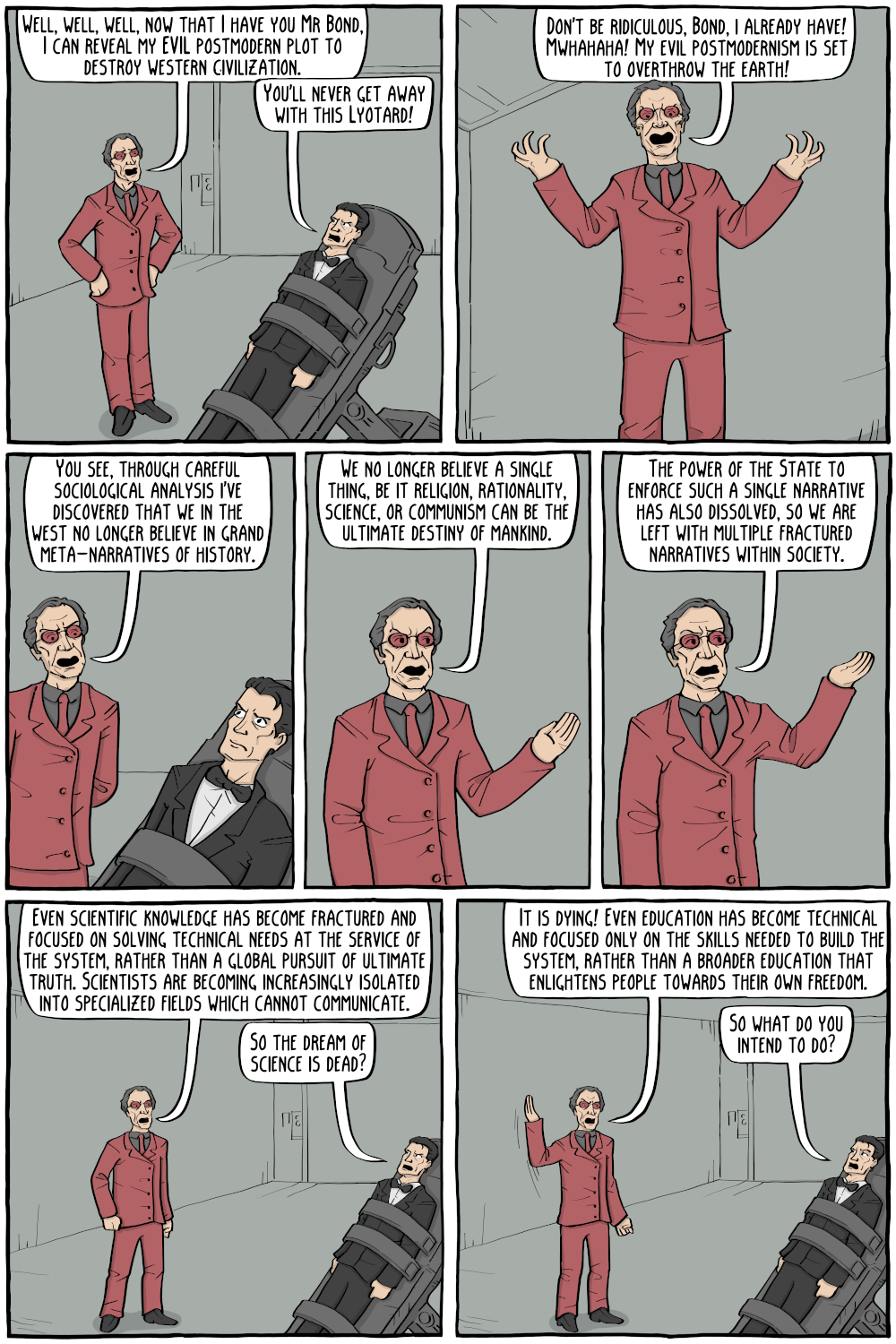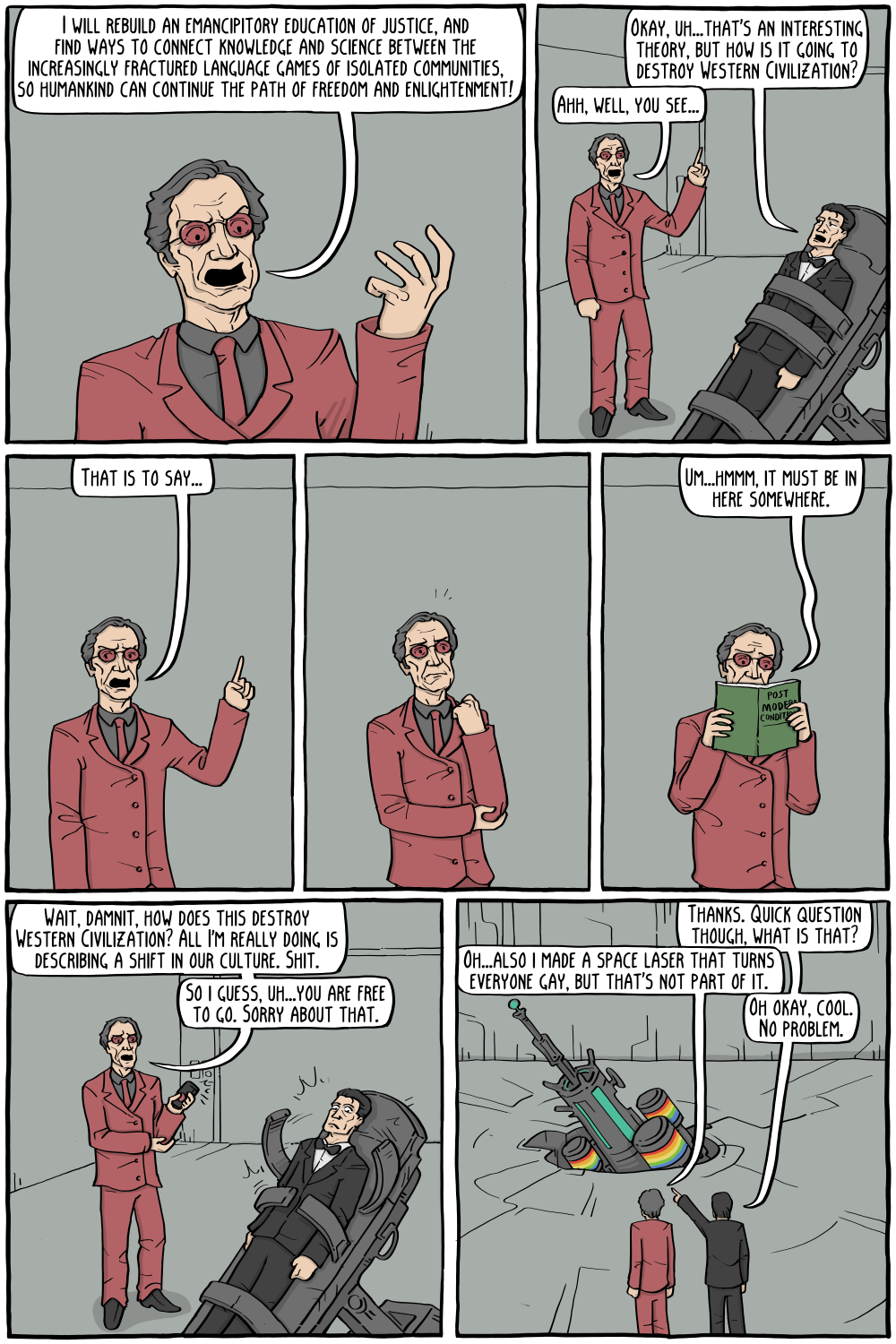Glad others found the topic and presentation as interesting as I did.
Doctor CamNC4Me wrote: ↑Mon May 10, 2021 6:29 pm
That was interesting and informative. In a nutshell, if after listening to Jordan Peterson talk about postmodernism in relation to hierarchies (I’d be surprised if you haven’t watch some of his videos) - and even if you haven’t given him a listen, what do you make of the phenomenon of new hierarchies forming socially, economically, and politically - where do you think we’re headed with regard to hierarchical structures in the near and far future?
- Doc
I'll try and tackle the connection to Peterson first before offering my thoughts on the question.
I've heard Jordan Peterson speak on podcasts and interviews, and he often brought up postmodernism. I didn't recall his view on hierarchies so I googled the topic and listened to one of the mid-length examples. It was interesting, but I don't think it provided a comprehensive explanation. So I'm going off what I recall from the other sources more so than the example with a specific discussion on hierarchies.
What I recall of Peterson's position was he often brought up postmodernism as an intellectual corruption spreading from institutions of higher learning. And it manifest in cancel culture, in liberal views regarding gender - often specifically to do with his own experience refusing to use non-traditional gender pronouns - as well as socialism/communism. He would venture off into references to Solzhenitsyn's The Gulag Archipelago. He often presented as a religious believer who embraced rationalism, and would argue for traditional male roles in society.
It's funny you identified him as I didn't think of him specifically when I first read the comic. But now that you bring him up I'd be surprised if the comic creator wasn't thinking of him specifically, if also including others as inspiration for the comic as well.
Whether or not that's true, I think Peterson represents a good example for why the political right views postmodernism as a specifically liberal problem that is destroying traditional western values through the rejection of the truth-value of the underlying meta-narratives. Ajax exemplifies the person who views the problems in the world as being rooted in the erosion of those narratives as well. Putting ourselves in their shoes, one might see that to them the idea a person may not identify as strictly male or female and gets to just say they are one, the other, or something else is like saying up is down, day is night, truth is falsehood, and lies are true. The conflicts in society between underprivileged, oppressed groups isn't seen as a problem so much as it's seen as more of the above - criminals and slothful people trying to subvert society to take from the deserving earners. At it's core, Peterson and those like him tie this to the rejection of God and the role of religion in society, and view it as a war of outright lies and perversions of truth against the fabric of society that's held the US in particular, and western democracies to a lesser extent, in a position of strength and acting as a shining beacon on a hill.
I didn't really find a source in my very minimal searching that explained his views on where hierarchies played into this. I've heard him talk about personal excellence and the idea that society rewards excellence so a person should start the day by, "making your damn bed". I don't recall the place I heard him say that exact phrase but he must have said it a few times because I recall it in his voice as one of the first things that comes to mind when I hear his name know. Is that bad as advice goes? Not at all. Is it dismissive of the obstacles people might face in society where the playing field isn't equal for all? Yeah. It's the kind of thing a person who believes they earned everything they've received might say.
What do I think about that?
First, I buy into the idea that humanity developing societal norms and values are an evolutionary advantage akin to developing explosives against other organisms that rely only on stone age tool making in the form of genetic mutations, and that memic evolution has been one of the most impactful aspects of our success as a species. By that I mean that we benefit from the speed by which we can evolve new ways of behaving as groups, and exchanging better ways of doing things for bad ways, at a pace that is exponentially faster than our biology evolves adaptations to environmental changes. But the timescale that occurs at is frustrating to our biologically evolved brains.
I get the sense that every generation feels like they live in chaotic, changing times because they do. We just lack perspective because our frame of reference is our childhood when life was more simple and sheltered, and an idealized past that never existed that people romanticize. I have no idea if what we are experiencing is normal or not. I think it probably is in a general sense, the details just differing from what others in the past experienced.
But history also shows us that every empire falls, every kingdom crumbles, every nation gets replaced eventually. Except for the age of exploration, China was the most powerful, most advanced civilization on earth and we could be heading back to what historically is a return to "normal" as our society struggles to find a meta-narrative we can share or unite around a common identity or belief that would allow the west to maintain it's five century moments of being on top. Are we like Magellan sailing across the Atlantic to find a safer passage to the Pacific Ocean only to then die on a beach demanding heathens convert to our obviously correct beliefs? Like his battered crew who sailed on to eventually find themselves among highly civilized Middle Eastern and Asian trade-routes where most of the globe was carrying on just fine without Europe? I don't know.
Wherever we're heading, it's almost certainly going to be change, and it will be the product of social competition. There will be winners and losers, and there's nothing to say that we in the US would recognize the winners a century from now as being decidedly American in origin or foundational organization.
I do think that meta-narratives matter, and that we all probably buy into one or two at least. I think mine has to do with the value and importance of civic virtues behind the enlightenment and small "d" democracy. I used to bring up the question of what we, as Americans with different political positions, might still share in terms of values or beliefs and was originally discouraged to find most people didn't think we did actually retain any core shared values. That was over ten years ago. I've brought it up every so often to see how that's evolved and it seems to have only gotten worse. So my meta-narrative is also eroded away just as those people who are gnashing their teeth at the decline of the Christian god in American daily life. I understand why older religious people become more pious, if isolated in their daily acts of devotion in a way because of that.

